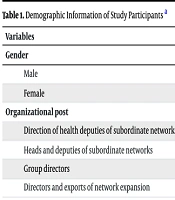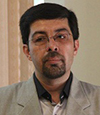1. Background
Managers, given their administrative background and key positions, possess abundant experience that organizations can utilize as a rich source of organizational knowledge (1). Universities and higher education institutions have leveraged innovations, philosophies, strategies, and techniques employed in private and commercial sectors to achieve academic objectives and create knowledge. The utilization of past knowledge and experiences in university educational processes is considered one of the fundamental principles of quality enhancement in activities. Accordingly, a program can gain organizational acceptance when it demonstrates the necessary precision and commitment in adhering to this principle (2).
Unfortunately, in our country, the documentation of activities has not been systematically and purposefully addressed. This deficiency has resulted in the dispersion of information and methodologies utilized in various organizational processes, including universities, which are considered intellectual assets of an organization. This scattered information becomes so diffuse that few individuals can navigate the challenging path of information acquisition, data collection, and classification for documenting experiences and scientific principles in subsequent references, ensuring progress without errors and waste of resources (3).
Given that managers' and public needs have evolved in recent years, and the healthcare sector has faced various crises, including the COVID-19 epidemic, conducting such studies for reviewing and utilizing managers' experiences is essential.
1.1. Current Challenges in Underprivileged Areas
1. Internal health system factors: (1) Human resource shortage; (2) lack of equipment and non-material resources, particularly hospital beds; (3) weak communication and interaction between healthcare staff and the public; (4) professional ethics gaps among some healthcare system personnel; (5) overcrowding in public healthcare facilities; (6) decreased public trust in public healthcare centers; (7) migration to other cities for medical treatment; (8) unauthorized border crossings.
2. External health system factors: (1) Economic factors; (2) cultural factors; (3) population dispersion in underprivileged areas; (4) impact of sanctions; (5) health insurance issues; (6) public identity documentation issues (4).
1.2. Current Situation Analysis
Underprivileged provinces lack adequate infrastructure. Additionally, there is a high tendency among staff and managers to leave these provinces. Therefore, utilizing their experiences could provide solutions to many current and future challenges. Experience is a primary learning pathway; managers can learn from their successes and failures. One of the primary benefits of experience is creating a historical perspective through which new conditions and events can be observed and understood. In fact, knowledge derived from experiences creates familiar patterns in the mind that enable connections between current developments and past occurrences.
2. Objectives
The aim of this study is to propose policy recommendations for solving health challenges in underprivileged areas.
3. Methods
This policy brief employed a qualitative approach using conventional content analysis, conducted in 2022 with practical objectives. The study population comprised all managers in the health sector of Zahedan University of Medical Sciences. Inclusion criteria included willingness to participate, holding a managerial position in the university's health sector units, and the ability to communicate effectively. Health assistants (top), network managers (middle), and community health service center managers (bottom) were included. Data collection was conducted through in-depth semi-structured interviews.
Following project approval by the university's Research Deputy and Ethics Committee and obtaining necessary permits, researchers identified target managers using sampling methodology. Initial contact was made either by phone or in person, explaining the study's objectives. A study summary, including objectives and interview guidelines, was provided, and interview appointments were scheduled. After each interview, recordings were promptly transcribed, digitized, and stored. Subsequently, interview texts were reviewed multiple times to ensure researchers' thorough familiarity with the data. In the third phase, data were broken down into meaningful units (codes) in the form of sentences and paragraphs related to the main concept. Similar codes were categorized into sub-categories, similar sub-categories were grouped into categories, and similar categories were classified as sub-themes, ultimately identifying the main themes.
4. Results
4.1. Funding
In this study, 30 health sector managers were interviewed. The demographic characteristics of participants are presented in Table 1.
| Variables | Values |
|---|---|
| Gender | |
| Male | 22 (73.4) |
| Female | 8 (26.6) |
| Organizational post | |
| Direction of health deputies of subordinate networks | 7 (23.3) |
| Heads and deputies of subordinate networks | 8 (26.6) |
| Group directors | 8 (26.6) |
| Directors and exports of network expansion | 7 (23.3) |
Demographic Information of Study Participants a
4.2. Interpretation of Results
Based on the results presented in Table 1, the study included 22 male and 8 female participants. The majority of participants were in the age range of 41 to 50 years old (60%). Furthermore, the majority of the participants held a Ph.D. degree (22 individuals, 73.4%).
4.2.1. Key Findings
1. Administrative and management challenges: (A) decreased employee motivation and service quality due to arbitrary regulations and lack of meritocracy in recruitment; (B) reduced motivation among committed and loyal staff due to informal relationships and unregulated hiring of contract workers who subsequently obtain key management positions.
2. Social and political challenges: (A) impact of external organizational factors on university performance and interference in relationships between the university and political authorities; (B) specific geographical and cultural conditions of the province, including distance from the center, adverse weather conditions, and sharing borders with two disease-prone countries; (C) ease of illegal border crossing between these countries, leading to disease transmission and cultural exchange between populations.
3. Ministerial and national challenges: (A) implementation of centrally-developed legislation uniformly across provinces without considering regional deprivation levels; (B) inconsistency and variation in ministerial policies across different periods and conflicts of interest in decision-making.
4. Human resources and financial challenges: (A) need for recruitment and retention of local, specialized, and permanent workforce as a fundamental challenge; (B) financial resource limitations constraining healthcare service delivery.
5. Discussion
Underprivileged provinces, particularly Sistan and Baluchestan, are characterized by ethnic, religious, and cultural diversity. Historical deprivation in infrastructure, low literacy levels, and provincial vastness directly impact university management. Manager selection must consider socio-cultural and ethnic factors, which can influence optimal selection processes. Political issues, policies adopted by various governments, and internal provincial political conditions have been influential over the years. Lindlöf et al. found in Sweden that appointing managers with political affiliations to public organizations presents both advantages and disadvantages for policymakers. The appointment of administrative and executive managers to ensure political commitment to strategies for increasing executive system efficiency, coupled with reactive politicization resulting in decreased executive system efficiency, demonstrates serious paradoxes in administrative affairs (5).
One of the most significant program weaknesses is human resource management challenges, including structural issues, improper and non-transparent changes in job duties, missions, recruitment of temporary and inefficient staff, low employee motivation in service delivery, disregard for job positions and individual needs, and sudden increases in workload for field-level personnel. Given these challenges and needs, adopting new evidence-based approaches in health system management and policy-making could improve health status in Sistan and Baluchestan province.
5.1. Policy Implementation
5.1.1. Micro and Medium Levels
Policymakers are recommended to:
1. Prioritizing local conditions: Considering provincial cultural, social, economic, and ethnic characteristics in manager selection and health policy development and implementation to enhance program effectiveness.
2. Strengthening management: Adopting transparent and merit-based policies in the recruitment and promotion of managers to increase university efficiency and productivity.
5.1.2. Macro Level
Human resource development: (1) Designing and implement appropriate educational and professional programs to improve service quality; (2) providing better conditions and benefits to attract and retain local and non-local specialists; (3) employment and payment equity – establishing a transparent and fair system for staff recruitment and compensation.

